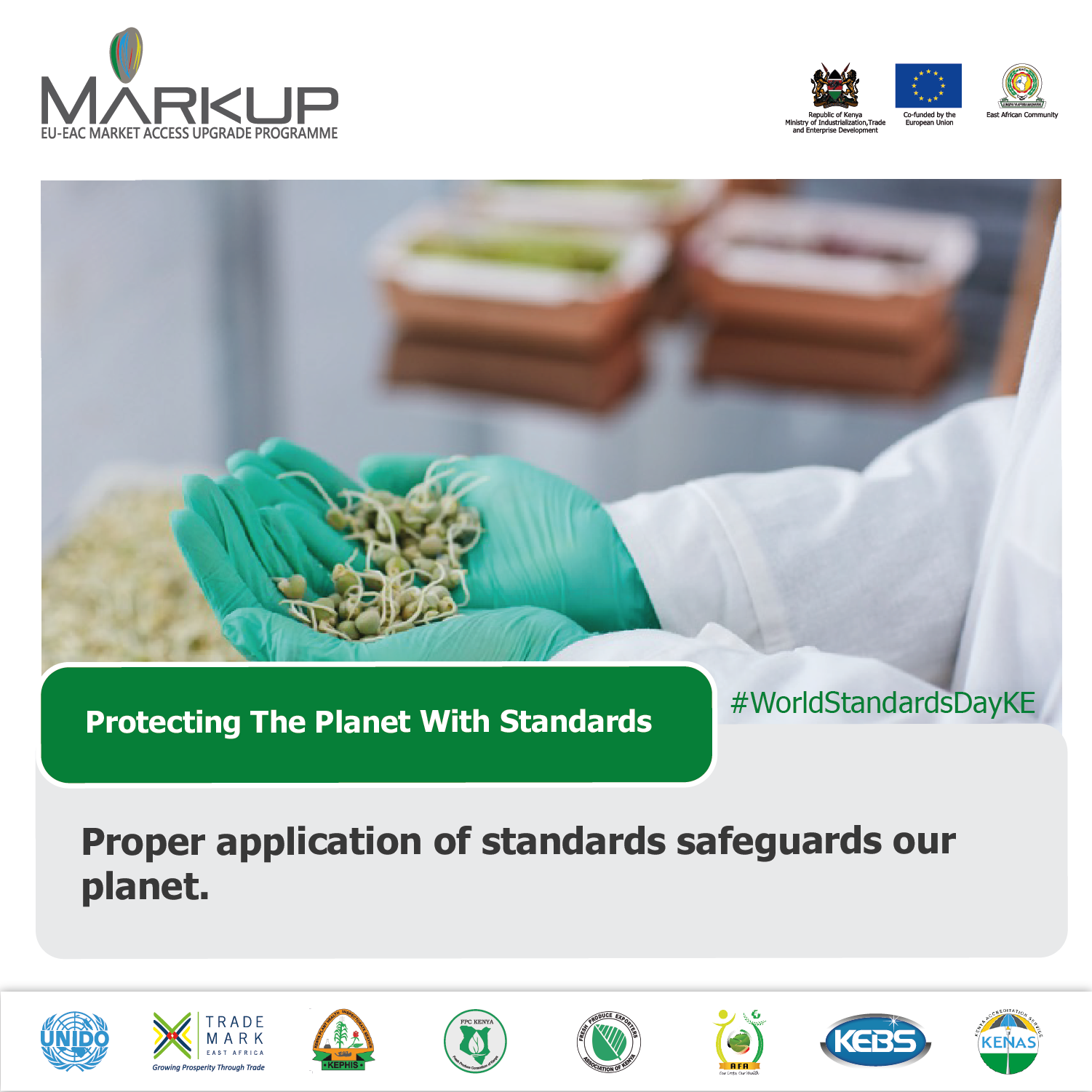MARKUP joins Partners in Marking World Standards Day

With support from the European Union (EU), MARKUP Kenya joined the World in marking the International Standards Day, on Wednesday, October 14, 2020.
MARKUP Kenya is keen in supporting key government and private institutions in promoting standards in a bid to enhance market competitiveness for Kenyan produce locally, regionally and internationally.
In marking this very important day, we bring to you a message from the EU ambassador Mr. Simon Mordue.
Also in this article, are messages from, messages from different partners for MARKUP Kenya.
Mr. Simon Mordue – EU Ambassador to Kenya;

Standards are very important, not only for the EU market, but also for Kenya. EU is the world’s largest common market and standards are important as they keep goods moving, and trade flowing. The EU population has very high expectations on what they consume for their own health and safety.
I see no reason as to why Kenyan consumers should not benefit from the same knowledge, so that when they consume produce like maize, fruits and vegetables, their health is protected the same as that of the EU citizens.
EU is the major destination for Kenya’s export produce, taking up to 80 percent of the same. This sector employs about 500,000 people.
Through MARKUP Kenya, stakeholders along the agriculture value chain will be trained on standards and how to access local, regional and international markets.
The trainees will receive practical experience on what they need to do, for example, use of the right pesticides.
By the end of the MARKUP programme, small scale producers are anticipated to be able to produce safer, higher quality produce, earn more and be able to export directly to the EU.
Maina Karuiru – National Project Coordinator, MARKUP Kenya

The main objective of MARKUP Kenya is to contribute to economic development of Kenya, by increasing the value of agricultural exports and local products.
The project aims at addressing two main challenges, one being inability to comply to market requirements and regulations, and to increase institutional capacity for those institutions that are involved in the conformity and compliance to market requirements.
To ensure access to bigger market, Kenyan growers and exporters must ensure that they comply to standards which are required by buyers in EU and other parts of the world. Such standards include Global GAP, KS1758, ISO standards, social and environmental standards.
MARKUP Kenya aims to support SMEs and Farmer Groups by providing capacity and technical assistance for these standards so that they are able to comply.
The project will also aim at training extension officers in the 12 counties where it is being implemented. The extension officers will especially be trained on standards and regulations required for market access.
This will ensure continuity of compliance beyond the project’s timeline.
Hosea Machuki – CEO, Fresh Produce Exporters Association of Kenya (FPEAK)

The World Standards Day is a day to pay tribute to many experts who work together to develop voluntary technical agreements that are then developed into international standards, implemented by a range of people within the block.
Our members are heavily involved in development of these standards and implementation of the same. Standards assure our consumers of quality, food safety, ethical and environmental process that are involved in food process.
FPEAK is keen to partner with MARKUP in creating awareness by training members, especially on KS1758 and Global GAP.
Dr. Andrew Edewa – Director, Standards and SPS Measures, Trademark East Africa

Standards can be defined as a document that sets out rules and guidelines on how a process or produce should look like or should perform.
Standards are very important tools that improve the quality of lives as they ensure products are safe, of high quality and conservation of the environment.
In trade, standards should be used as a language of doing business. They offer specifications which ease communication between buyers and sellers.
Benjamin Too – Interim Head, Horticultural Crops Directorate (HCD)

Also known as the Code of Practice, KS1758 is the local standard which covers horticulture practices along the value chain.
It covers right from production, processing up to market.
Although it is domesticated, KS1758 borrows heavily from the Global GAP.
Standards should apply both locally and internationally. We are all human and therefore, we should produce food which is safe for all markets.
